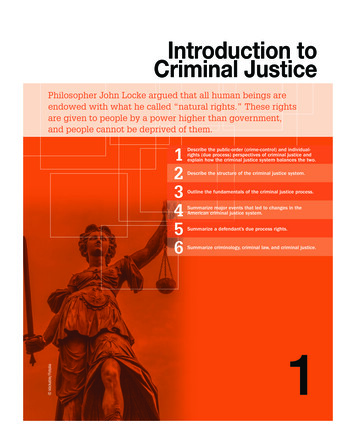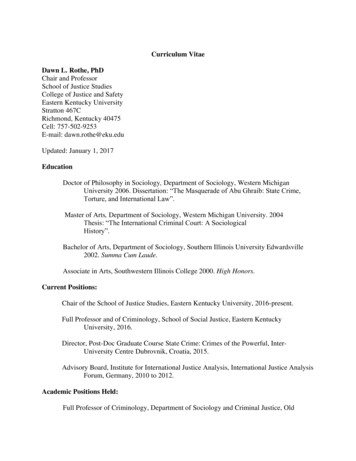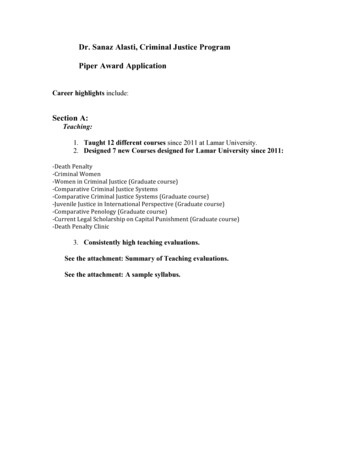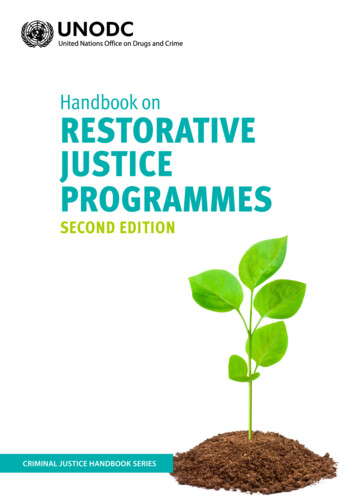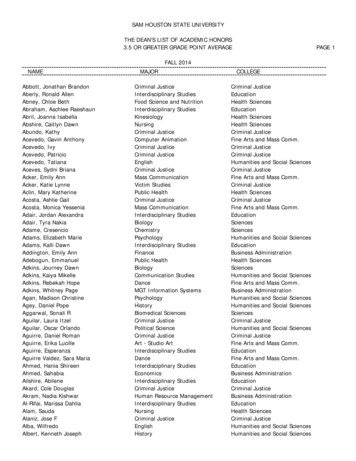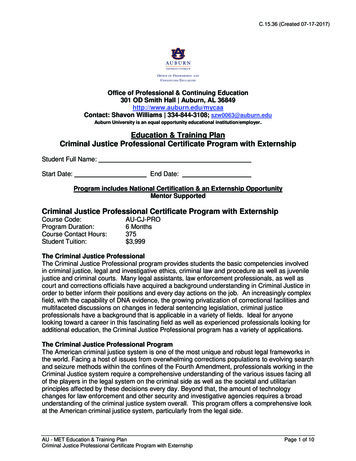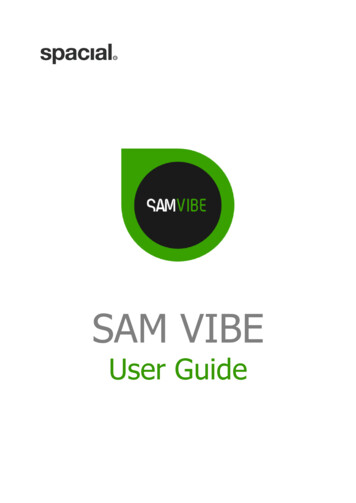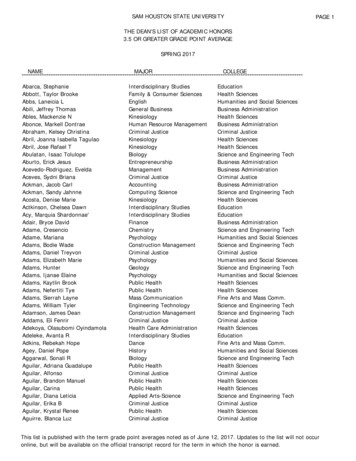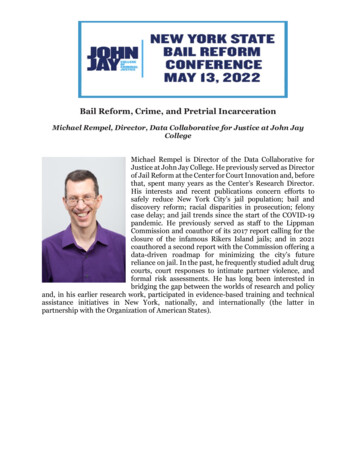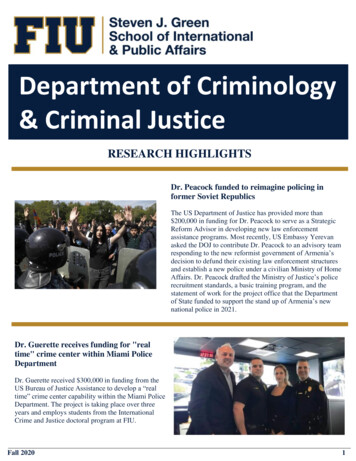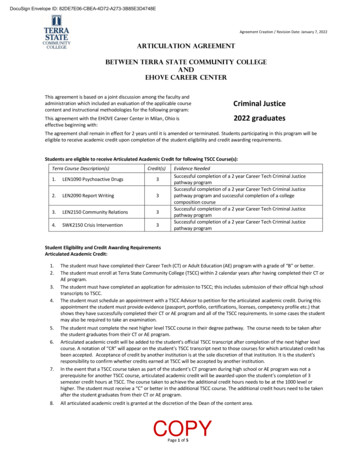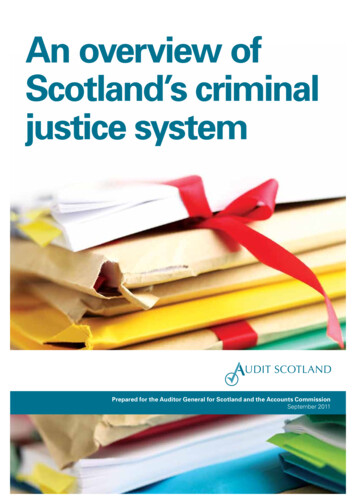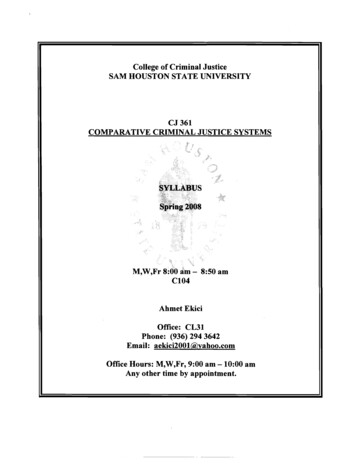
Transcription
College of Criminal JusticeSAM HOUSTON STATE UNIVERSITYCJ361COMPARATIVE CRIMINAL JUSTICE SYSTEMSM,W,Fr 8:00 am - 8:50 amCI04Ahmet EkiciOffice: CL31Phone: (936) 294 3642Email: aekici2001@yahoo.comOffice Hours: M,W,Fr, 9:00 am -10:00 amAny other time by appointment.
TEXTBOOK(S): .Reichel, P. L. (2005). Comparative criminal justice systems (5 th ed.). New Jersey: PrenticeHall.*Supplemental handouts will also be provided throughout the semester when deemed useful inaccordance with course objectives.** Guest speakers will make presentations.*** Dates of topics in Syllabus are subject to change based on guest speakers' availability andany new material that will be added thought to be useful and related to the course.COURSE DESCRIPTION:Comparative Criminal Justice Systems course will provide students with a comparativeoverview of justice systems in different cultures and countries. The course will focus onhistorical, politicaland social factors, and explain their influence on justice systems.Emphasis will be on social, political and global influences on the development andimplementation of criminal justice practice and policy. The course will provide students with anunderstanding of differences in Common, Civil, Socialist and Islamic legal systems. The coursewill then focus on how a variety of different countries around the world interpret and approachsuch issues as policing, the court system, corrections and juvenile justice.COURSE OBJECTIVES Assess the strengths and weaknesses of the different methodologies in comparativeresearch. Understand criminal justice agencies and the way they operate in a comparative context. Get an overall picture of the World's different criminal justice systems by touching onsample country examples. Expand knowledge and develop a better understanding of other countries and theircultures. Identify and explain the differences and similarities of their own and other criminaljustice systems. Recognize that every legal and criminal justice system is the product of differentintertwining and interacting historical, socioeconomic and cultural factors. Understand the role of police, criminal court systems, correctional systems, purposes ofpunishment, and international forms ofjustice in a modem society.2
ANNOTATED COURSE OUTLINE:Week 1: January1/16 Course introduction1/18 Discussion of syllabus.Week 2: 1/21 NO CLASS Martin Luther King Day1/23 Video (David Bayley) The Worldwide Frontier of Policing1/25 Continue video and Discussion of BayleyWeek 3: 1/28 ChI An International Perspective, Rationale: Studying Legal1/30 ChI Systems of Other Countries Approach,2/1 ChI Strategies, and the Need for ClassificationWeek 4: 2/4 Ch2 Crime, Transnational Crime and Justice,2/6 Ch2 the Crime Problem, Comparing Crime Rates Crime Trends and Theories2/8 Guest Speaker Hasan T. Arslan TRANSNATIONAL CRIMEWeek 5: 2/11 Ch3 An American Perspective on2/13 Ch3 Criminal Law2/15 Ch3 SubstantiveIProcedurallawWeek 6: 2/18 Ch4 Legal Systems and Traditions2/20 Ch4 Four Legal Traditions2/22 Ch4 Comparing Legal Traditions / Guest speaker Shih-ya Kuo (Connie) CHINAWeek 7: 2/25 Ch5 SubstantiveIProcedural2/27 Ch5 Law in the Four2/29 Ch5 Legal TraditionsWeek 8: 3/33/53/7Ch6 International Perspectives:Guest Speaker Joe Serio RUSSIAGuest Speaker Joe Serio RUSSIAWeek 9: 3/17 Ch Midterm review3/19 Library Study Hour3/21 MIDTERM EXAMWeekl0:3/24 Ch6 International Perspectives (Cont)3/26 Ch6 Policing, Classifying Police Structures3/28 NO SCHOOL Good FridayWeekll :3/31 Guest Speaker Murat Sever, INTERPOL4/2 Ch7 International Perspective: Courts Professionals4/4 Ch7 Actors in the Judiciary, Adjudicators Variation in Court OrganizationWeek 12: 4/7 Ch8 An International Perspective on Corrections: Comparative Penology4/9 Ch8 Justification, Forms of Punishment, Prison Alternatives3
4/11 Guest Speaker Kyung Yon Jhi (Karl) (S. KOREA)Week 13: 4/14 Ch9 Int. Perspective on Juvenile Justice: Delinquency as a World Wide Problem4/16 Ch9 Models of Juvenile Justice4/18 Chl0 Japan'sWeek 14: 4/21 Chl0 criminal justice system4/23 Term Paper presentations4/25 Term Paper presentationsWeek 15: 4/28 Term Paper presentations4/30 Term Paper presentations5/2 Term Paper presentationsWeek 16: 5/5 Final Exam Review5/7 Library study hour5/12 FINAL EXAMREQUIREMENTS:1- Reaction papers: Each student is required to prepare 2 reaction papers covering thereadings of the week ofhislher choice. The reaction papers are to be two page doublespace, you are expected to summarize and critic the readings. The reaction papers are duethe day before the chapter is going to be covered.2- Mid term and final exam. Exams will consist of 50 multiple choice questions.3- Term Paper and in class presentation:Each student will prepare a comparative study ofjustice systems of at least two countries.The study may be focused on policing, corrections, courts, crime statistics, juvenilejustice systems, rehabilitation or punishment practices, etc. You are encouraged todiscuss your choice of topic prior to start with the instructor. The paper is to be at least 5pages double spaced, APA style and with proper citation. (Wikipedia is not a scholarlysource, may no be used as a main source) Use of at least 6 scholarly sources arerequired, internet sources may be used but should be as minimum as possible. Allstudents are required to make a presentation of their paper in class. Use of multi media isencouraged. The papers are to be submitted to "Turnit.com" for originality and submittedby email to the instructor. Further instructions about paper will be discussed in class.Term paper is due 4/21/2008 5pm4- Class participation and attendance: See attendance policy. Attendance does not meanonly presence in class but active participation as well.GradingMid termFinal ExamReaction paperTerm paperAttlParticipation30%30%10%20%10%4
Summary of Due DatesMarch 21 st Mid term ExamApril 21 stTerm paperthMay 12Final ExamCOMMUNICATION: Will be by email, PLEASE USE THE EMAIL PROVIDED on thefirst page of the syllabus. Always welcome during office hours, other than that please let meknow in advance so that I can be in the office.ATTENDANCE POLICY: Attendance (See Academic Policy Statement 800401)School policyRegular and punctual class attendance is expected of each student. Each facultymember will keep a record of student attendance. A student shall not be penalized forthree or fewer hours of absences when examinations or other assigned class-work havenot been missed; however, a student may be penalized for more than three hours ofabsences at the discretion of the instructor. Class absences will be recorded andcounted only from the actual day of enrollment for the individual student in thatspecific class.My policyStudents will be allowed 6 days (6 Hours) of absences. Each absence in excess of 6hours will reduce the final grade average by 10 points unless there is a justifiableexcuse and the instructor is infonned in advance and an approval is obtained. If youcan not notify in advance do it ASAP but always with email and provide supportingdocuments later on. Students with more than 10 days (10 hours) of absences withoutjustifiable excuse will receive a grade of F in the course.Electronic devices: Laptops are welcome to be used for the course purpose, and not surfing orgaming. Cell phones; only in silent mode, and absolutely no text messaging during class hours.and are to be kept in bag or pocket not on table.Make-Up Exams: An examination should be missed only in the event of illness or other trulyextenuating circumstances. The instructor should be infonned in advance. A make-upexamination will be arranged on a case-by-case basis.SHSU Policy StatementsAcademic Honesty: The faculty of the College of Criminal Justice expects students to conducttheir academic work with integrity and honesty. Acts of academic dishonesty will not betolerated and can result in the failure of a course and dismissal from the University.Academic dishonesty includes, but is not limited to, cheating on a test, plagiarism, collusion the unauthorized collaboration with another person in preparing work offered for credit, the5
abuse of resource materials, and misrepresentation of credentials or accomplishments as amember of the College. "Turn it in" will be used to check for originality of papers.The University's policy on academic honesty and appeal procedures can be found in the manual 1.a.C'.tvd .n,. ·.idc1innn.o . .:ihutad.hIl.," c.T);.",: o.n.r-.j:'.s.t .,.3cr""C;: 6""""'L.VE).j:''U" rrn. instravel for that purpose. A student whose absence is excused under this subsection may not bepenalized for that absence and shall be allowed to take an examination or complete anassignment from which the student is excused within a reasonable time after the absence.University policy 861001 provides the procedures to be followed by the student and instructor.A student desiring to absent himselflherself from a scheduled class in order to observe (a)religious holy day(s) shall present to each instructor involved a written statement concerning thereligious holy day(s). This request must be made in the first fifteen days of the semester or thefirst seven days of a summer session in which the absence(s) will occur. The instructor willcomplete a form notifying the student of a reasonable timeframe in which the missedassignments and/or examinations are to be quirements.html#holidayDisabled Student Policy: It is the policy of Sam Houston State University that no otherwisequalified disabled individual shall, solely by reason of hislher handicap, be excluded from theparticipation in, be denied the benefits of, or be subjected to discrimination under any academicor Student Life program or activity. Disabled students may request help with academicallyrelated problems stemming from individual disabilities from their instructors, school/departmentchair, or by contacting the Chair of the Committee for Continuing Assistance for DisabledStudents and Director of the Counseling Center, Lee Drain Annex, or by calling (936) 294-1720.For disabled student policy please visit: httn://www.shsu.edu/scheduleFor services for disabled students please visit: http://www.shsu.edu/ counsel/sswd.html6
Comparative Criminal Justice Systems course will provide students with a comparative overview of justice systems in different cultures and countries. The course will focus on historical, political and social factors, and explain their influence on justice systems. Emphasis will be on social, political and global influences on the development .
